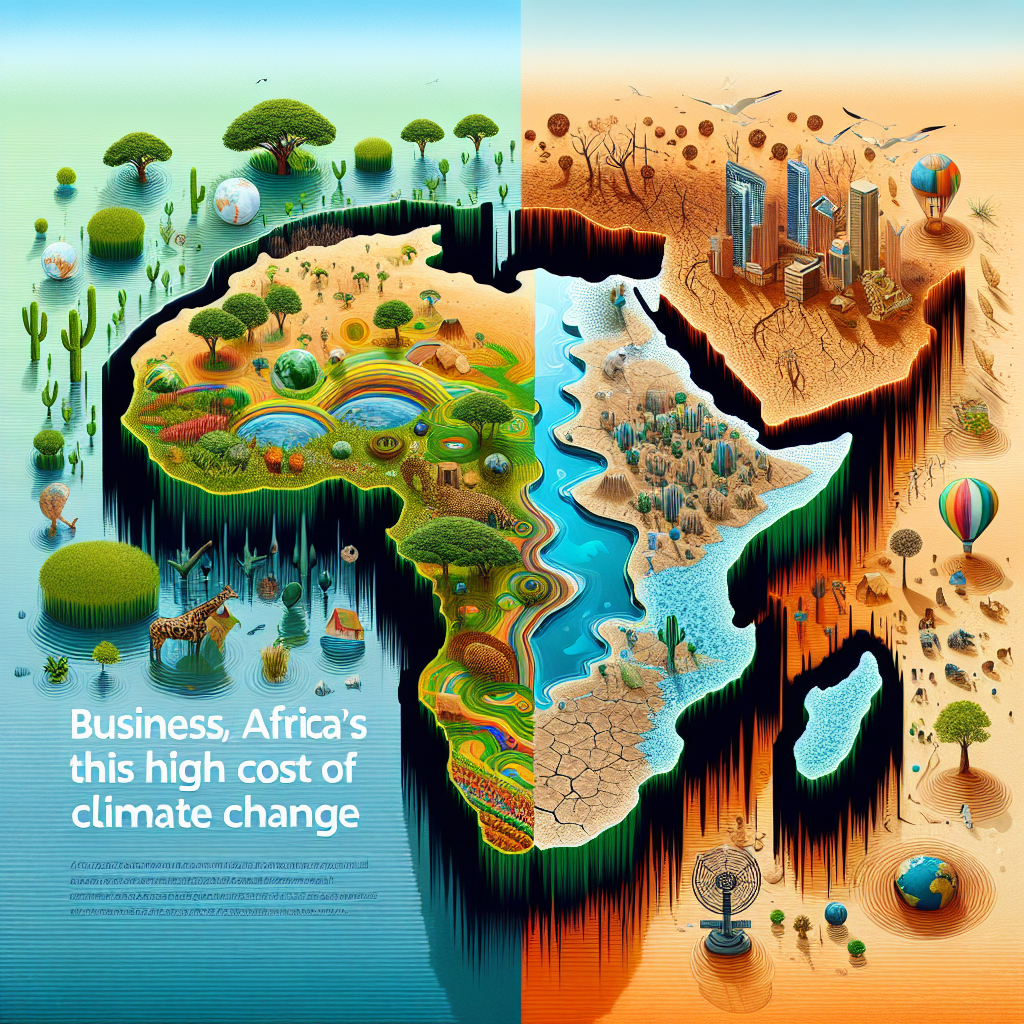The High Cost of Climate Change in Africa: A Business Perspective
Climate change is a global crisis, but its impact is disproportionately felt across different regions. Africa, with its unique geographical and socio-economic landscape, is particularly vulnerable. The continent faces a myriad of challenges due to climate change, which in turn affects its business environment. This article delves into the high cost of climate change in Africa, exploring its implications for businesses and the broader economy.
Introduction: The Climate Conundrum in Africa
Africa is home to some of the world’s fastest-growing economies, yet it is also one of the most vulnerable continents to climate change. The Intergovernmental Panel on Climate Change (IPCC) has highlighted that Africa is warming faster than the global average, leading to severe consequences for its people and economies. The continent’s reliance on agriculture, limited infrastructure, and socio-economic challenges exacerbate the impact of climate change.
Why Climate Change Matters for African Businesses
For businesses in Africa, climate change is not just an environmental issue; it is a significant economic challenge. The effects of climate change, such as extreme weather events, rising temperatures, and changing rainfall patterns, directly impact business operations, supply chains, and market dynamics. Understanding these impacts is crucial for businesses to adapt and thrive in a changing climate.
The Economic Impact of Climate Change on African Businesses
Agriculture: The Backbone Under Threat
Agriculture is the backbone of many African economies, employing a significant portion of the population. However, climate change poses a severe threat to this sector:
- Erratic Rainfall: Unpredictable rainfall patterns lead to crop failures and reduced agricultural productivity.
- Droughts and Floods: Increased frequency of droughts and floods disrupt farming activities and damage infrastructure.
- Pest and Disease Outbreaks: Warmer temperatures create favorable conditions for pests and diseases, affecting crop yields.
These challenges not only threaten food security but also have a ripple effect on businesses that rely on agricultural products.
Energy Sector: Navigating Uncertainty
The energy sector in Africa is also grappling with the effects of climate change:
- Hydropower Vulnerability: Many African countries rely on hydropower, which is susceptible to changes in rainfall and water availability.
- Increased Energy Demand: Rising temperatures lead to higher energy demand for cooling, straining existing infrastructure.
- Renewable Energy Opportunities: Despite challenges, climate change presents opportunities for investment in renewable energy sources like solar and wind.
Infrastructure: Building Resilience
Infrastructure is critical for economic development, but climate change poses significant risks:
- Damage from Extreme Weather: Roads, bridges, and buildings are vulnerable to damage from storms, floods, and rising sea levels.
- Increased Maintenance Costs: The need for climate-resilient infrastructure increases maintenance and construction costs.
- Urbanization Challenges: Rapid urbanization exacerbates the impact of climate change on infrastructure, requiring innovative solutions.
Adapting to Climate Change: Strategies for African Businesses
Risk Assessment and Management
Businesses must conduct thorough risk assessments to understand their vulnerabilities to climate change. This involves:
- Identifying Key Risks: Understanding how climate change affects operations, supply chains, and markets.
- Developing Contingency Plans: Creating strategies to mitigate risks and ensure business continuity.
- Investing in Insurance: Exploring insurance options to protect against climate-related losses.
Embracing Sustainable Practices
Sustainability is not just a buzzword; it is a necessity for businesses facing climate change:
- Resource Efficiency: Implementing practices to reduce energy and water consumption.
- Sustainable Supply Chains: Partnering with suppliers who prioritize sustainability.
- Corporate Social Responsibility (CSR): Engaging in CSR initiatives that address climate change and support local communities.
Innovation and Technology
Innovation and technology play a crucial role in helping businesses adapt to climate change:
- Climate-Smart Agriculture: Adopting technologies that enhance agricultural resilience, such as drought-resistant crops and precision farming.
- Renewable Energy Solutions: Investing in solar, wind, and other renewable energy sources to reduce carbon footprints.
- Data and Analytics: Leveraging data to make informed decisions and optimize operations in response to climate change.
The Role of Governments and International Organizations
Policy and Regulation
Governments have a critical role in creating an enabling environment for businesses to adapt to climate change:
- Climate Policies: Implementing policies that promote sustainable practices and reduce carbon emissions.
- Incentives for Green Investments: Providing tax breaks and subsidies for businesses investing in renewable energy and sustainable technologies.
- Infrastructure Development: Investing in climate-resilient infrastructure to support economic growth.
International Support and Collaboration
International organizations and partnerships are essential in addressing the high cost of climate change in Africa:
- Funding and Resources: Providing financial support and resources for climate adaptation projects.
- Knowledge Sharing: Facilitating the exchange of knowledge and best practices among countries and businesses.
- Capacity Building: Supporting capacity-building initiatives to enhance local expertise in climate adaptation.
Conclusion: A Call to Action
The high cost of climate change in Africa is a pressing issue that requires urgent attention from businesses, governments, and international organizations. By understanding the challenges and opportunities presented by climate change, African businesses can adapt and thrive in a changing environment. It is time for all stakeholders to come together and take decisive action to build a sustainable and resilient future for Africa.
In conclusion, while the challenges are significant, the potential for innovation and growth in response to climate change is immense. By embracing sustainable practices, investing in technology, and fostering collaboration, Africa can turn the tide on climate change and secure a prosperous future for its people and businesses.
